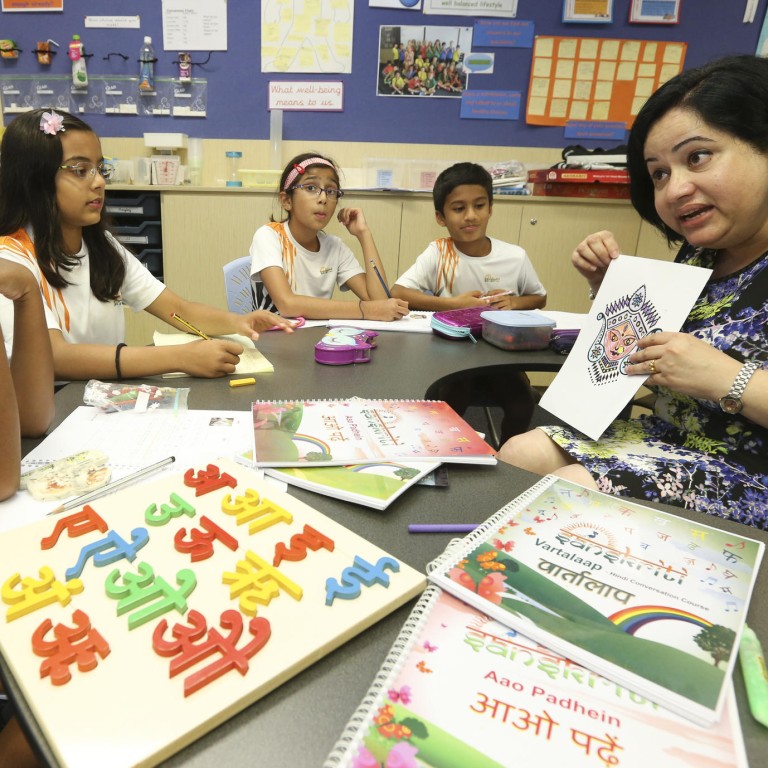
Expats who try to instil some of their country's culture in their children
It can be hard for smaller expatriate communities to pass their culture on to the next generation, but some find ways to address this challenge
When Geetanjali Dhar moved to Hong Kong in 1999, she struggled to find good, structured Hindi-language programmes for her young son. The scattered classes available either lacked a strong cultural component or focused only on what was in vogue, such as Bollywood song and dance.
Seeing her son's expatriate friends natter away in their native languages, Dhar decided to address the gap in Hindi programmes: she set up Sanskriti, a school offering language lessons and cultural immersion for the children she describes as "global Indian".
"Children need to retain their own culture while adapting to life abroad," says Dhar.
Sanskriti, which means "heritage" in Hindi, now has 95 students. Many are ethnic Indians whose families have lived in Hong Kong for generations; others have only recently relocated to the city.
"Children whose cultural roots are strengthened are more confident because they know where they belong," Dhar says, as her students settle enthusiastically into their first task of the afternoon: colouring a picture of the Hindu goddess Durga to learn about the Navratri festival, which leads up to Diwali.
The language component of Sanskriti's programme uses not only traditional books and worksheets but also folk songs and rhymes adapted for children who have little access to Hindi in daily life. Beyond having fun, these classes also prepare students for Hindi examinations run by the Indian government.
Cultural activities are integral to Sanskriti's programme: its "annual day", when students dress up in costume and perform everything from song and folk dances to drama in the language, is among the school's most anticipated activities.

This dedication to cultural immersion is what draws parents to the school.
"Mrs Dhar doesn't just teach the language but gets children interested in the culture as well. That is very important for us," says Anjali Grover, whose six-year-old daughter was a Sanskriti student. "We want the kids to feel Indian, but that is sometimes hard as they grow up here and go to international schools."
A number of its students come from mixed families, including Huong Sabherwal's son Joaquin, six, who has been asking to learn Hindi ever since he visited his great-grandparents in Shimla, northern India. "The integrated way of teaching and learning here makes him feel a part of a bigger cultural identity," she says.
Larger communities such as the French have their own international schools. But smaller expatriate groups - such as Hong Kong's 300-plus Finns - must rely on private classes to help youngsters retain proficiency in their native languages and maintain their cultural identities.
Children need to retain their own culture while adapting to life abroad
On alternate Saturday mornings, about 20 children gather at "Finnish school" held in borrowed premises for two hours of immersion in their mother tongue.
Tommi Svinhufvud, who serves as a volunteer teacher, has two daughters studying at the international school where he teaches. Although he tries hard to maintain the language at home, Svinhufvud believes the immersion sessions are important as Finnish children living in Hong Kong have little access to the language outside their families.
"The classes focus not only on speaking but also on academic skills like writing, because the children do not learn the language formally in school," he says. "We also create an environment where they can feel a sense of community around their peers."
Finnish is known for its complexity, which makes proficiency especially difficult. At the school, younger students learn the language from stories and games while older ones, such as 14-year-old Inka Hyttinen, focus on grammar exercises. "At school, I only write in English, so it's important to practise writing in Finnish," she says. "Catching up with my Finnish friends is also great, because we have known each other for a long time but all go to different schools."

"The Finnish community in Hong Kong is active and inclusive but also mixed. Some children have grown up here while others have recently arrived," says Petra Sarja, organiser of the Finnish school.
"But you can see that there is a lot in common that bonds them, even though their backgrounds and ages are so different," says Sarja, who was a school principal in Finland.
For children from a country with a population smaller than that of Hong Kong, preserving this shared cultural identity is especially important.
The local Dutch-speaking community, made up of about 6,000 expatriates from the Netherlands and others from Belgium, also supports lively language programmes for children outside the formal school system.
LanguageOne Hong Kong, part of a Dutch organisation that provides mother tongue education worldwide, runs a weekly after-school programme offering a rigorous curriculum corresponding to the eight years of elementary education in the Netherlands.
Impressively, although the students only devote two hours per week to learning Dutch, many are on par with their peers back home or just a year behind. This strong academic focus gives youngsters the option of re-entering the Dutch education system in the future.
"The school provides a very important foundation for Dutch education abroad," says Leandra Lok, LanguageOne's local director. "This really helps students preserve their sense of identity in a foreign country."
Like other mother tongue programmes, there's a social element to the weekly Dutch school, which also operates a lending library and organises cultural activities.
Students sometimes find the lessons stressful because they mean extra work, but Dutch parents believe strongly in their academic and cultural merits. Dieke Agricola, for one, wants her two children to learn their native language "to a proficiency beyond being able to communicate with family".
